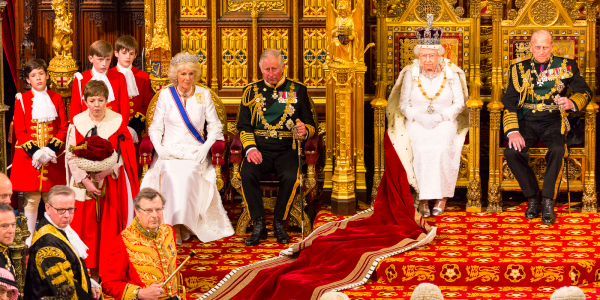Threat of prorogation: what can the Commons do?
The Prime Minister has requested and received consent for the current parliament to be prorogued, and plans to introduce a new Queen’s Speech before the Brexit deadline of 31 October. David Howarth assesses the options available for those wishing to oppose this and enable the Commons to prevent a no deal Brexit.

State Opening of Parliament. Picture: Copyright House of Lords 2016 / Photography by Roger Harris/ parliamentary copyright.
Boris Johnson’s plan to advise the Queen to prorogue Parliament, from 9 September to 14 October, has several advantages for him in addition to the obvious one that it would close Parliament down during a period in which otherwise it might legislate against a no deal Brexit or vote for a motion of no confidence. It means that the House of Commons will not need to vote on a sittings motion to go into recess for the party conferences, robbing opponents of a no deal Brexit of one of their opportunities to seize control of the Commons’ agenda. And it means that, because a new session of parliament would begin, he could put to the Commons a Brexit deal so close to Theresa May’s deal that the Speaker would otherwise rule it out as asking the House to vote on the same matter twice. As a result, his opponents might turn out to include not only the remain parties and anti-no dealers, but also pro-no deal anti-dealers.
So, apart from legal action (whose chances of success, while not zero, are low), what options are now available to his opponents?
1. A motion of no confidence
Time still remains, before 9 September, for the Commons to bring the government down and replace it with another government. Johnson’s spokespeople have repeated their threat that if the Commons passed a motion of no confidence, the government would not resign but would sit tight for the statutory fourteen days, precipitating a general election which Johnson, using a power created in s. 2(7) of the Fixed-term Parliaments Act 2011, would set for after Brexit day.
Johnson’s plan works unless the opposition can put together a majority for a new emergency government. The problem, illustrated over the summer, is that Jeremy Corbyn (whose commitment to stopping a chaotic Brexit precipitated by the Conservatives is not universally accepted) will not support any candidate for the job of emergency Prime Minister other than himself but the Conservative MPs who might otherwise vote for an emergency government would not support Corbyn. Something has to give for this route to work.
Even if it did work, a further problem might be that Johnson would refuse to resign anyway. He would come under pressure from the Cabinet Secretary and the Queen’s Private Secretary to do the right thing and not embarrass the Queen, but it is far from clear that Johnson would succumb. At that point, the Queen might exercise her undoubted legal power to dismiss him. But she might be unwilling to do that without further political cover. That could come in the form of a resolution of the House of Commons confirming that not only did the House have no confidence in Johnson, but also it did have confidence in a specified alternate Prime Minister.
Given that the Speaker of the House, John Bercow, has described Johnson’s plan as ‘a constitutional outrage’, the normal problem for an opposition that the government controls the agenda of the House might well fade away. The Speaker has two important powers that undermine the government’s control of the agenda: to allow emergency debates under SO 24 (newly reinterpreted as allowing amendments as long as the text of the motion is not ‘neutral’) and motions about parliamentary privilege, which includes motions about contempt of parliament. Either of these could be used to allow the House to debate relevant motions.
Other options to force Johnson out include two moves from the last era (more than two centuries ago) in which ministers claimed that they did not need the confidence of the House of Commons to govern: (1) emergency legislation simply declaring Johnson no longer to be Prime Minister and making it a criminal offence for him to purport to exercise the powers of the office, the modern equivalent of an Act of Attainder; and, (2) impeachment, last used in the early 19th century but never formally abolished, although unless the House of Lords acted with unusual haste, it might be too slow for use in the current crisis. The charge would be misconduct in public office.
2. Legislation
Opponents of the government already seemed to be planning to seize control of the order paper and pass legislation designed to stop a no deal Brexit. If enough time exists to pass a Bill before prorogation starts, another way to stop the prorogation would be to add a clause to the Bill making it unlawful for ministers to advise the Queen to prorogue unless the Commons had voted for it and requiring the Prime Minister to advise the Queen, under the terms of the Meeting of Parliament Act 1797, to ask parliament to sit regardless of the order to prorogue.
The government possibly believes that the opposition would be stymied by a rule that says that Bills affecting the royal prerogative cannot pass unless the Queen has given consent, and the government controls whether the Queen is asked for her consent. But many ways exist of getting around that rule. For one thing, the government has accepted that the rule is purely one of House of Commons procedure and so the Speaker decides whether it applies.
3. Contempt
Another possibility is for the Commons to find Johnson in contempt of the House. Erskine May, the bible of parliamentary procedure, says that contempt includes ‘any act or omission which obstructs or impedes either House of Parliament in the performance of its functions’. The 14 October date seems to have been chosen to prevent questioning of the government, and possible motions of no confidence and emergency legislation, before the next European Council, and to make it easier to run down the clock after that date. Arguably, therefore, Johnson has committed contempt.
Contempt motions are not subject to the government’s control of the order paper. They are debated at the discretion of the Speaker.
If Johnson is found in contempt, what then? What if he refuses to purge his contempt by reversing the prorogation? Sanctions for contempt against people who are not MPs seem weak, as the case of Dominic Cummings shows. But against MPs, the position is quite different. Ultimately, the House can expel any member of parliament by resolution, as it did, for example in 1954. As a non-member, it would be very difficult for Johnson to carry on as Prime Minister. Even if he declared his intention to stand in a by-election, the House could resolve that it would expel him again (or it could even refuse to hold the by-election).
4. Humble Address
A final possibility would be for the House, having seized control of the agenda, to ask the Queen not to listen to Johnson and not to prorogue Parliament. The Commons could do this using the established mechanism of a ‘Humble Address’, motion to send the Queen a polite message.
From the point of view of the Queen’s advisers, this would be the ultimate nightmare, because it would raise the prospect of placing the Queen at the centre of politics, the last place they want her to be. But, before the Queen needed to make a decision, such a motion would undoubtedly establish, without risking a general election, that Johnson lacked the confidence of the House. The right to give advice to the Queen on constitutional matters is one of the central privileges of the Prime Minister, and for the House to resolve that Johnson cannot be trusted to exercise it would amount to the clearest possible decision that he lacked their confidence. If Johnson were a man of honour, he would, to avoid causing the Queen embarrassment, immediately resign.
On the assumption, however, that Johnson is not a man of honour, the Humble Address would at least provide even clearer grounds than already exist for bringing a contempt motion.
This article gives the views of the author, and not the position of Democratic Audit.
About the author

David Howarth is Professor of Law and Public Policy, University of Cambridge.





 Democratic Audit's core funding is provided by the Joseph Rowntree Charitable Trust. Additional funding is provided by the London School of Economics.
Democratic Audit's core funding is provided by the Joseph Rowntree Charitable Trust. Additional funding is provided by the London School of Economics.
I’m glad to see an article laying out the possibilities like this. Ultimately, none of them will work because the Remainers wouldn’t know what to do with power even if they succeeded. It reminds me of the BlackAdder WW I episode where when Captain Blackadder questions whether a 17th frontal assault is a good idea,General Frye says, “They’ll never expect us to try again!”
Legislation feels like the right thing to do, not least because it’s a case of the Legislature against the Government.
I assume there is a possibility that certain members of the House of Lords might “filibuster” so that the Bill falls at the impending end of the parliamentary session.
While beyond the scope of this article, I do wonder whether the UK being outside the EU, while Eire is within the EU, is compatible with the Good Friday Agreement (GFA). Even if we leave with no deal, could we eventually move to a Canada style free trade deal without compromising the GFA?
This suggests -notwithstanding the timing issue- that legislation is the most straightforward route to block a no deal. But wouldn’t it have to do more, and positively mandate the government to do something, I.e. accept a deal or request an extension (which the EU might not want to give). Could this have potential financial implications, and as such might it be subjectable to a government veto on the grounds that it places a charge on the public purse?
Bless you. A bit long for the side of a bus but surely leaflets can be left on buses.
Can Parliament take control of its agenda next week and simply vote in a prorogation bill which would give itself powers to limit the length of prorogation and put in other procedural safeguards? It would maintain the status quo without the need for a contempt vote, humble address, anti Brexit legislation.
good on Boris . The remainers in goverment are the undemocratic one, we had vote to come out, they should honour the democratic vote.
No deal must be stopped – nobody voted for that
Nonsense there was never that as an option as everybody knows it was a straight in or out and of course out clearly won.